Tue February 28, 2012
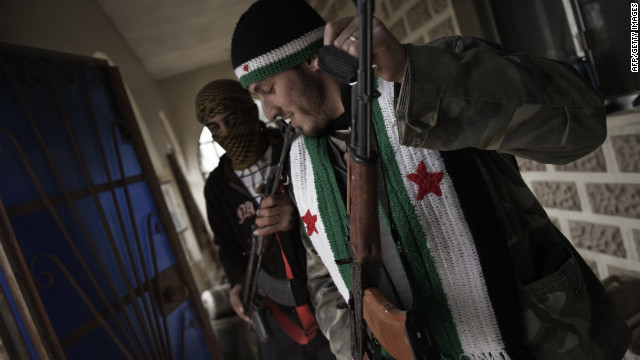
'Horrifying massacre' in Syria
STORY HIGHLIGHTS
- U.N.: Hundreds of thousands of Syrians are displaced
- U.S. secretary of state: Syrian president could be tried for war crimes
- 91 people are killed across Syria on Tuesday, including 50 in Homs
- Syria's foreign minister claims the regime is providing necessary services to civilians
However, Clinton said Tuesday, pursuing charges against al-Assad may hinder efforts to persuade him to cede power.
The United Nations has credible reports that "the death toll now often exceeds 100 civilians a day, including women and children. The total is certainly well over 7,500."
Opposition activists and world leaders believe thousands of Syrians have died since March in a sustained government crackdown on dissenters.
At least 91 people, including three women and two children, were killed across Syria on Tuesday alone, said the Local Coordination Committees of Syria, a network of opposition activists.
The deaths include 50 in the opposition stronghold of Homs, which has been pummeled by government forces for more than three weeks. Of those, 26 died in "another massacre" in the city's Baba Amr neighborhood, the LCC said. Twenty-seven others died in the suburbs of Hama, where hundreds were also injured in a fifth day of shelling.
Another opposition group, the Syrian Observatory for Human Rights, said five members of the Syrian army were killed in predawn clashes with defected soldiers in Daraa province.
The deaths followed a grim day Monday, when 144 people died nationwide, the LCC said.
CNN and other media outlets cannot independently verify opposition or government reports because Syria has severely limited access to the country by foreign journalists. But the vast majority of reports from the ground indicate that government forces are killing citizens in an attempt to wipe out civilians seeking al-Assad's ouster.
Al-Assad's regime has "subjected residents in several cities to indiscriminant bombardment by tank and rocket fire," Lynn Pascoe, the U.N.'s undersecretary general for political affairs, told the U.N. Security Council on Tuesday.
Clinton, asked at a Senate Appropriations Committee whether al-Assad should be viewed as a war criminal, said, "I think that based on definitions of war criminal and crimes against humanity, there would be an argument to be made that he would fit into that category."
Asked about making that argument before the world community, Clinton said, "I think people have been putting forth the argument, but I also think from long experience that could complicate a resolution of a difficult, complex situation because it limits options to persuade leaders perhaps to step down from power."
Earlier Tuesday, Syrian Foreign Minister Walid Moallem insisted that no regime cares more about its citizens than that of Syria.
"We are not happy to see brothers killing each other," he said.
No one in Syria is dying from hunger or illness, he said, and the government is providing all necessary services despite an "economic international boycott."
The LCC said about 9,000 people have been killed since the government launched its crackdown on dissidents in March. The Syrian government says that more than 2,000 members of its security forces have been killed by "terrorists" during that same period.
International pressure on Damascus continued to mount Tuesday as the U.N. Human Rights Council met in Geneva, Switzerland, to hear more on an International Commission of Inquiry report saying Syrian government officials were responsible for "crimes against humanity" committed by security forces against opposition members.
U.N. Human Rights Commissioner Navi Pillay told the council her office has received "disturbing reports of a rapidly deteriorating human rights and humanitarian situation. Recent reports further indicate that Syrian military and security forces have launched massive campaigns of arrest, arbitrarily detaining thousands of protesters, as well as activists and others suspected of anti-government activities."
The cities of Hama and Homs have borne the brunt of the violence, she said. During government blockades, residents cannot obtain food, water or medical supplies and some cannot reach hospitals, she said. The hospitals themselves are overwhelmed, with citizens setting up makeshift clinics lacking medical supplies.
Some reports suggest more than 500 children have been killed since the unrest began in March, Pillay said. The Syrian government reported 2,493 civilians and 1,345 soldiers and police killed between March and January 18 of this year, she said, but "according to information available to my office, the actual numbers may far exceed these figures."
The Syrian government has been somewhat cooperative, allowing Arab League observers into the country as well as giving controlled access to aid groups, she said. The Arab League later suspended its monitoring mission amid ongoing violence.
"However, these steps pale into insignificance in the face of the continuing onslaught of violence and arrest against people by state actors," Pillay said. "In light of this and in the face of the unspeakable violations that take place every moment, I remain convinced that referring the situation of Syria to the International Criminal Court will be a step in the right direction."
Syria's parliament representative to the council, Fayssal Al-Hamwi, denounced the session and eventually walked out of the meeting, according to the state-run Syrian Arab News Agency.
Al-Hamwi said the "true goal" of the session is to cover up "violence and murder committed by armed terrorist groups against innocent civilians," SANA reported.
Unilateral economic sanctions against Syria, he said, "are the ugliest violations of human rights, because they target foremost civilian populations including children, women and the elderly."
"The delegation of the Syrian Arab Republic announces non-acknowledgement of the legitimacy of this session,'' he said, according to SANA.
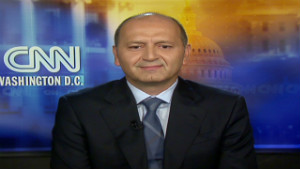 The role of Syrian National Council
The role of Syrian National Council 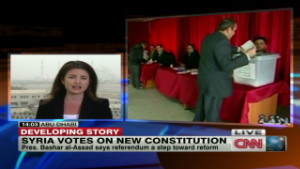 Syria votes on new constitution
Syria votes on new constitution 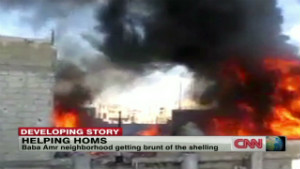 Wounded evacuated from Homs, Syria
Wounded evacuated from Homs, Syria 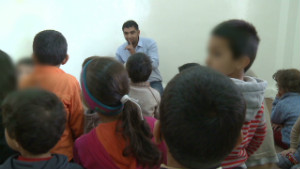 Syrian refugees flee to Jordan
Syrian refugees flee to Jordan The moves "will put further pressure on those who are responsible for the ruthless campaign of repression in Syria," Catherine Ashton, the EU foreign policy chief, said in a written statement. "The measures target the regime and its ability to conduct the appalling violence against civilians. As long as the repression continues, the EU will keep imposing sanctions."
The International Commission of Inquiry said in its report that U.N. bodies probing the crimes should identify perpetrators and hold them accountable. It said it had turned over a list of those believed to be responsible to Pillay's office.
Along with rising casualties, the number of displaced people was mounting, Pascoe told the Security Council on Tuesday.
"Approximately 25,000 refugees are now registered with UNHCR in neighboring countries, and between 100,000 and 200,000 people are internally displaced," he said.
Meanwhile, British photographer Paul Conroy, who was wounded in an attack that left two other journalists dead last week in the Baba Amr neighborhood of Homs, was safe in Lebanon Tuesday after being smuggled out of Syria, said Wissam Tarif of the international activist network Avaaz.
London's Sunday Times confirmed Conroy was in Lebanon.
"I have spoken to Paul this morning and he sounded in good spirits," Conroy's wife, Kate, said in a statement released by the newspaper. "The family are overjoyed and relieved that he is safe and look forward to getting him home."
But French journalist Edith Bouvier, who was injured in the same attack, and other journalists are refusing to leave Homs without guarantees from the Syrian government that their photographs and recordings will not be confiscated, according to the LCC.
Bouvier and two other journalists are thought to be in the same field hospital in Baba Amr where they were last week, Avaaz said.
There was no word on the location of the bodies of journalists Marie Colvin and Remi Ochlik, who were killed in the incident.






No comments:
Post a Comment